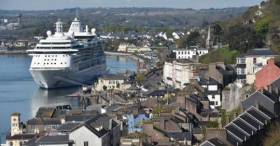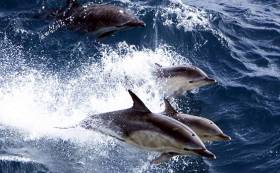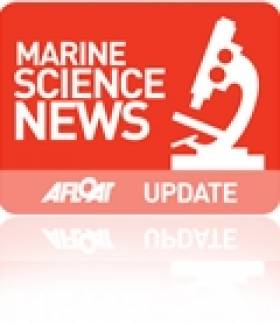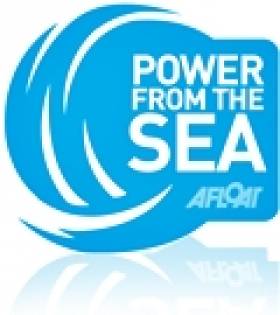Displaying items by tag: noise pollution
Ahead of its broadcast this weekend, Newstalk previews A Sea of Sound, a new radio documentary that explores the impact of noise pollution on marine wildlife.
Marine mammals such as dolphins and whales effectively ‘see’ through sound in the water. “So to understand the life they lead, as the Irish Whale and Dolphin Group’s Simon Berrow says, we need to “think acoustically”.
Producer John Higgins spoke to Berrow and other environmental stakeholders for the documentary, which also features some of the remarkable sounds of whales and dolphins communicating beneath the waves — and explores the sounds that threaten them, from seismic surveys to military sonar and more.
A Sea of Sound will be broadcast on Newstalk this Sunday morning 27 March at 7am, with a repeat on Saturday 2 April at 9pm. It will also be available as a podcast.
When cruiseships dock in Cobh they have been warned to keep quiet by the Port of Cork.
The busy port, writes Echolive, which sees up to 100 cruise liners docking throughout the year in the tourist town, has issued a statement regarding noise levels at certain times in an effort to maintain a good relationship with local residents.
In a notice, issued by Captain Paul O’Regan, who is Harbour Master and Chief Operations Officer for the Port of Cork, cruise liner captains were asked to reduce noise pollution in the area.
The notice from Captain O’Regan said that due to the topography of Cobh Cruise Berth, the sound from passenger announcements, music played on external decks and alarm sirens were amplified and this can be an issue for the surrounding residential properties.
To find out the times ship masters must adhere to when using alarms and announcements click here.
Over 300 scientists are meeting in Dublin this week discussing the effects of noise on aquatic life. A public talk on Noise and its impact in the Ocean will be given tonight (Tuesday 12th July) 8 – 9:30pm at the O’Callaghan Alexander Hotel, Fenian Street, off Merrion Square in Dublin.
When people think of pollution they conjure up images of sewage spilling into the oceans, massive oil spills, floating rubbish and maybe even toxic chemicals. Noise pollution, however, is easily left out of such thoughts. Nevertheless, pollution from noise is likely as dangerous to many marine animals as any other type of pollution.
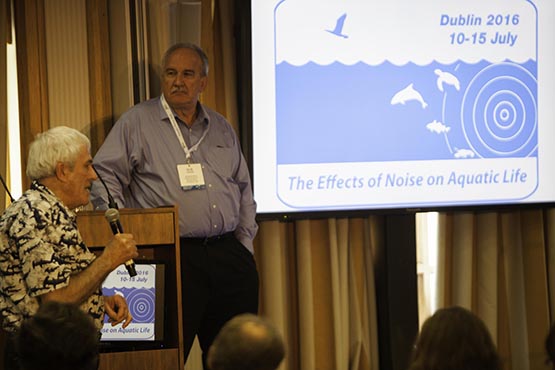 Anthony Hawkins (Aquatic Noise Trust UK) and Robert Gisnier (International Association of Geophsyical Contractors US) met with 300 scientists attending the 4th International Conference on the Effects of Noise on Aquatic Life. A public talk on Noise in the Ocean and its impact will be given tonight at 8 – 9:30pm at the O’Callaghan Alexander Hotel, Fenian Street, off Merrion Square in Dublin
Anthony Hawkins (Aquatic Noise Trust UK) and Robert Gisnier (International Association of Geophsyical Contractors US) met with 300 scientists attending the 4th International Conference on the Effects of Noise on Aquatic Life. A public talk on Noise in the Ocean and its impact will be given tonight at 8 – 9:30pm at the O’Callaghan Alexander Hotel, Fenian Street, off Merrion Square in Dublin
Getting Into the Smarts Behind SmartBay as Noise Data Project Switches On
#MARINE SCIENCE - Apart from some of the world's largest concentrations of wave energy, the waters of Galway Bay and the west coast of Ireland are now providing something potentially even more valuable - information.
That's according to IBM's Harry Kolar writing for the blog A Smarter Planet, as he discusses the start of his company's new underwater data collection project developed in association with the Sustainable Energy Authority of Ireland (SEAI) and the Marine Institute.
As previously reported on Afloat.ie, the system comprises an array of noise sensing equipment such as hydrophones deployed in Galway Bay to monitor the noise levels produced by wave energy conversion devices in real time.
This array is attached to a large monitoring buoy about 2km from the southern shore, and constantly transmits the data it records to a receiving system on land.
The scheme, which was finally switched on last month, is an offshoot of the SmartBay initiative for developing and testing new marine technology to foster future commercial development in the fast-growing marine science sector. The 'Twitter buoy' deployed for the Volvo Ocean Race finale recently is another of the project's schemes.
"Initially, the system will capture and analyse the ambient noise of the ocean to establish a baseline of acoustics including natural and anthropogenic (man-made) sound sources including vessel traffic," writes Kolar.
"But the ultimate goal is to capture and analyse the sounds and vibrations of hulking wave energy conversion machines that have begun bobbing along off the coast and help determine what, if any impact the sound waves from those devices could have on marine life – but especially highly sensitive dolphin, porpoise, and whale populations."
A Smarter Planet has much more on the story HERE.
New Scheme to Measure Noise Pollution from Wave Energy
#POWER FROM THE SEA - The Sustainable Energy Authority of Ireland (SEAI) is teaming with IBM in a new project to assess the noise levels of wave energy devices off the Irish coast.
The scheme will see an array of noise sensing equipment such as hydrophones deployed in Galway Bay to monitor the noise levels of wave energy conversion devices in real time, as well as map patterns of marine life in the area.
According to AOL Energy, noise pollution at sea is a chief concern, having a disturbing effect on fish migrations among other marine ecosystems.
The west of Ireland will prove an important case study in this regard, as it hosts one of the world's largest wave energy infrastructures.
"Underwater noise is a global environmental issue that has to be addressed if we are going to take advantage of the huge potential of ocean energy," said EU Commissioner for Research, Innovation and Science, Maire Geoghegan-Quinn.
AOL Energy has more on the story HERE.


























